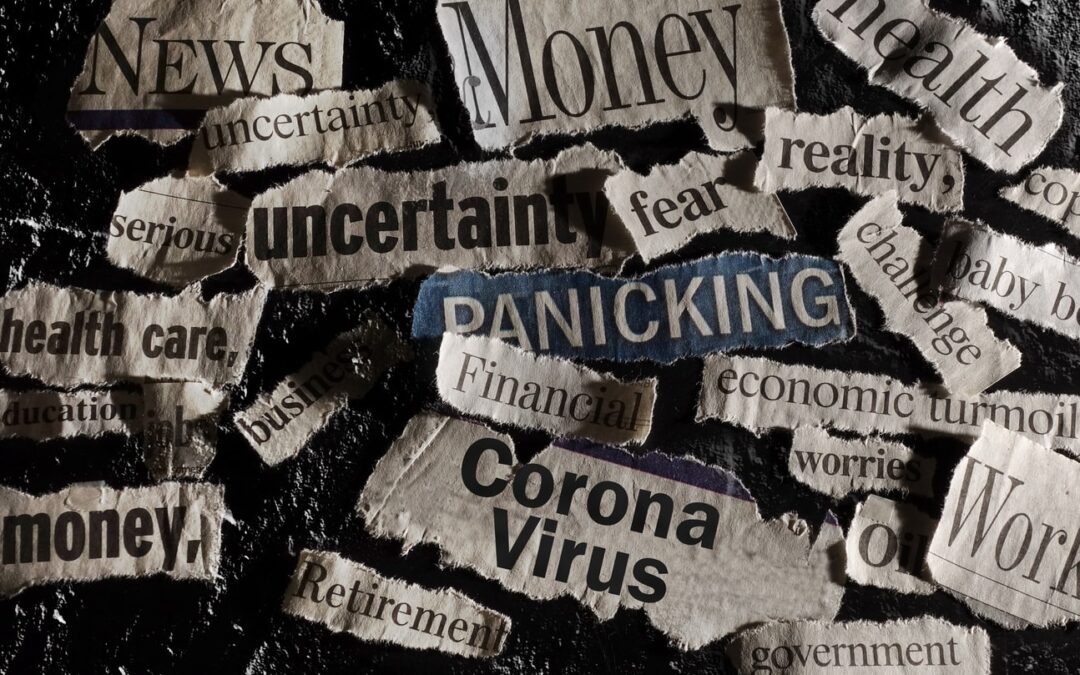
Anxiety, Obsessive Compulsive Disorder, Panic Attacks
Maybe you recently experienced your first panic attack, or maybe you have been dealing with this issue for quite some time now.
Either way, you know that you can’t simply “think positively” to ward off a panic attack. Telling yourself over and over again that there’s nothing to worry about won’t necessarily work either.
And while you might be able to avoid your triggers sometimes, this method isn’t foolproof, either. Sometimes, you don’t even know what set off your panic attack—the cause is a mystery, and you don’t know how to get to the root of the problem.
Why is it so hard to break the cycle of panic attacks? Because your (totally natural) fear of experiencing another panic attack can actually make you more susceptible to them. Here’s how this cycle of panic perpetuates itself.
The Build up of Anxiety and Triggers That Lead to a Panic Attack
Maybe something in your environment triggers a painful and traumatic memory of a past experience. Or maybe you notice the symptoms building out of nowhere.
Suddenly, you have shortness of breath. Your heart feels like it is racing. You begin feeling chest pain and struggle to verbalize what’s wrong.
Am I dying? What if I’m having a heart attack? Will I black out? you wonder. Although nothing is physically wrong with you, it’s impossible to “think your way out” of these symptoms, and you experience a panic attack.
A panic attack does not feel the same for everybody who experiences one. However, many people report worrying that they might actually be dying. Some even go to the emergency room because they are caught off guard by a feeling of impending doom combined with their physical symptoms. It is typical to experience overwhelming fear and a sense of complete loss of control.
People will also react differently to panic attacks. Some may try to remain calm and wait for it to be over, while others will cry. If someone is in a crowded space, they will usually try to leave if they are able since a sense of claustrophobia can make their symptoms worse. As dizziness is also a common symptom, they may feel that they need to sit or lie down. They might also feel like they’re going to vomit.
Anxiety About Future Panic Attacks
The symptoms of a panic attack can fade on their own. Generally, someone suffering from a panic attack does not need immediate medical attention. This does not mean that what they’ve experienced can be dismissed as something that was “all in their head.”
While some who went through their first panic attack might feel confused or uncertain about what happened, one trend generally holds true for all: they will be nervous about the possibility that it can happen again. This is a completely normal human reaction to experiencing such an event.
Unfortunately, though, the mounting anxiety over a future panic attack can actually make one more likely.
This is why people who experience panic attacks often feel like they are trapped in a cycle. Worrying about a panic attack means that you are dealing with higher levels of anxiety. Therefore, you’re more vulnerable to experiencing another panic attack. And with every additional panic attack, those feelings of anxiety only grow stronger.
Breaking the Cycle of Panic Attacks
How can you finally free yourself from this cycle? Panic attacks have one thing in common- they all end. Anxiety tricks you into believing that there is danger when, in reality, your symptoms are extremely uncomfortable but not dangerous. When you are able to stand up to the anxiety, you will be able to break the cycle. It may be time to turn to a therapist for professional help. Having someone who is willing to work alongside you and be patient with you as you process your fears and anxieties can make all the difference in the world.
A therapist can also help you determine what may be triggering your anxiety and panic attacks. Equipped with that knowledge, you can work together on strategies to prevent them or how to use coping techniques to minimize them and eventually overcome them.
—
Are you struggling to break free from the cycle of anxiety and panic attacks? You do not have to go through this journey alone. Seeking professional health could be the right step for you. If you would like to know how I could help you, please feel free to contact me.

Anxiety, Obsessive Compulsive Disorder, Panic Attacks
There are many different approaches to treating and managing panic disorder and obsessive compulsive disorder (OCD).
While these two conditions are not the same, there are some similarities in commonly prescribed treatments. One such method that therapists can utilize for both conditions is exposure therapy and response prevention (ERP).
Exposure therapy may sound like an oxymoron. After all, how can exposing yourself to the things you fear most actually be an effective therapeutic treatment for a mental health condition? While it may sound contradictory, this method is actually quite sound.
Here’s how using exposure therapy under the guidance of a qualified therapist can help people with panic disorder and OCD.
The Basis of Exposure Therapy with Response Prevention
So, what is the basic principle behind exposure therapy? In general, people with OCD or panic disorder do their best to avoid the situations that trigger their fears. This is a completely rational response to fear. And in the short term, it is the easiest way to protect yourself from what you’re afraid of.
Exposure therapy, however, aims to eliminate that urge to avoid certain situations. Throughout the course of treatment, you will ideally learn that the thing you were fearing doesn’t pose a real threat or danger after all. And, if you’re dealing with OCD, you also will slowly let go of your compulsive need for certain rituals before facing specific situations. By choosing to stop the compulsions (i.e. prevent the responses), you will learn to habituate to the anxiety feelings and decrease the intensity and frequency of the obsessive thoughts. The ERP approach allows you to break free from the vicious cycle of anxiety.
What’s Wrong With Avoidance?
We all go out of our way to avoid things that make us feel anxious or afraid sometimes. So, if we all do it occasionally, how bad can avoidance really be?
When avoidance becomes your sole strategy for dealing with a particular fear, and it begins to interfere with your everyday life and holds you back from doing what you love, another approach is necessary. Avoidance is a form of temporary relief, but it does not actually improve your overall quality of life in the long term. Eventually, it can lead to the development of other harmful behavior patterns. Over time, avoiding the fear or participating in compulsive thoughts or rituals actually increases your anxiety and may lead to extreme responses such as never leaving the house.
Getting Started
How can you begin exposure therapy sessions? It starts with the therapist working closely together with you to establish a trusting relationship and identify exactly what you fear. They will also discuss what you may view as your “worst-case scenario.”
Essentially, the goal of this collaboration is to target exactly what you’re most afraid of happening. To prepare for the treatment phase, the therapist will use everything they’ve gathered to put together a careful, step-by-step plan (also called hierarchy of fears) for gradual exposure.
How It Works
Over time, the therapist will slowly expose you to what you fear. This may include imaginal (thinking about your fears) or in-vivo (in real life). The in-vivo exposure will take place in a completely safe environment with the support and company of the therapist. You will never have to enter a chaotic situation during treatment where you have to face your triggers with no support. The idea is to start with less distressing fears and gradually move up to more fearful situations as you gain confidence to face your anxiety.
In these scenarios, you’re not supposed to make any efforts to avoid or minimize your exposure to the trigger. Of course, this can be very difficult. But with their therapist’s support it can get easier. And that’s exactly why they’re there.
Ultimate Goal
By the end of the treatment course, the ultimate goal of exposure therapy is to ensure that you no longer feel the need to avoid the trigger. Alternatively, if you have OCD, you will recognize that you will be safe without performing rituals and mental compulsions or responses. Through consistent exposure therapy followed by response prevention, you can begin to see that the situation you thought was so dangerous is not the threat that your mind built it up to be.
Ideally, you will slowly stop practicing avoidance in your daily life.
Exposure therapy is not a method of erasing memories of traumatic events or telling a person that their fears don’t matter. To the contrary, proving to them that they are capable of facing these triggers without being harmed is the ultimate goal.
—
Do you suffer from panic disorder or OCD? Are you interested in trying exposure therapy and response prevention (ERP) to see if this approach can help you in your healing journey? As a trained CBT and ERP psychologist, I can help you decide if ERP would be helpful for you. Feel free to contact me to discuss the benefits of exposure therapy and next steps.

Depression
Most of us struggle to practice self-compassion. We don’t want to go too easy on ourselves. And so, we assume that the only way to make progress is by berating ourselves for our mistakes until we can correct them.
However, this mindset can be quite destructive. After all, this is not how we would treat a loved one in crisis mode. Yet, when it is us who is facing a critical situation, we often treat ourselves with a lack of self-compassion.
Self-compassion means being gentle with ourselves, especially when we’ve done something wrong. Neglecting being compassionate with ourselves can send us into a downward spiral. It can even contribute to depression.
Here’s why self-compassion and forgiveness are so important, and why ignoring these practices can damage your mental health.
The Roots of Depression
Yes, clinical depression can be caused by a chemical imbalance in the brain. But there are other factors that can contribute to depression too. For example, neglecting to eat a healthy diet or exercise and not getting enough sleep can all be detrimental to your mental health.
The way you think about yourself can affect your mental health as well. If you tell yourself that you are uniquely flawed and not good enough, it’s easy to feel like you will never see happier days. And if you feel bogged down by every mistake you make, you might think there is no light at the end of the tunnel.
Letting Go of Self-Judgment
We can be our own worst critics. But letting go of guilt is the key to real self-compassion. Self-compassion and self-forgiveness go hand in hand. Many of us spend our days dealing with an “I owe” mentality.
Yes, we owe each other kindness, generosity, patience, and honesty. But we do not owe each other perfection!
You cannot expect that of yourself. Nor can you punish yourself when people expect it from you and you’re unable to deliver. Allowing anger and shame to “lead” your life will not bring you happiness or fulfillment. Forgiving yourself for past mistakes is just as important as receiving forgiveness from others.
Accepting Mistakes
When your friend makes a mistake and comes to you for advice, what do you do? Do you tell them that they should be ashamed of themselves? Or do you give them a hug, let them know that you still love them, and assure them that everything will be okay in the end?
This is the way you should accept our own mistakes as well. Being warm and understanding towards yourself is the key to inner peace and self-compassion.
The Big Picture
Many of us over-identify with our failures. Meanwhile, we ignore our successes and don’t give ourselves enough credit for our achievements. Yet, we feel like our mistakes make us who we are. But we can’t look at one or two mistakes or achievements and say that someone is a success or failure. We’re more than that.
Instead of thinking of yourself as a “success” or “failure,” you need to learn to see the big picture. Every human being has their strengths and weaknesses, and self-compassion means recognizing and accepting both can exist at the same time. They make us human.
Shared Humanity
One thing that will help you be a little kinder to yourself: remembering that you are never alone in your mistakes. It’s a shared experience!
Every single one of us makes the wrong choice sometimes. We all let down the people whom we love. Everyone has done things that they regret.
Sometimes, we allow our failures to isolate us. But the truth is that our mistakes can actually unite us. We can be compassionate towards ourselves, and towards each other, rather than being unforgiving and harsh.
—
Do you feel like you’ve never quite gotten the hang of self-compassion? Ever wish you could be kinder to yourself? It can be tough to break out of an unforgiving and “not good enough” mindset, but therapy can help.
If you have additional questions or would like to know how I can help you develop more self-compassion, please contact me.

Relationship Help
Being in a relationship can be very fulfilling. But not all relationships are healthy and thriving. Losing yourself in a relationship may be a signal that your relationship is unhealthy or a sign that you feel some insecurity and anxiety about losing the relationship.
When you’re anxious and insecure about the relationship, it’s easy to lose yourself. You might find that you spend all of your time with your partner and their friends for fear of missing out on opportunities to spend time together. Perhaps your loved ones have noticed that they don’t see you as much anymore.
Maybe you’ve put your old hobbies on the back burner or quit doing things you once found fun because your partner did not have the same interests. Or you may have simply given up on the goals you had before the relationship, and instead, your entire focus has been on your partner.
But just because you feel like you’ve lost yourself doesn’t mean you can’t discover yourself again. Rather than wait for your partner to make you feel secure, it is important for you to take control of your thoughts and behaviors. How your partner responds to these changes may be a good indicator as to whether this person is healthy for you. If you’ve been putting your own needs and wants aside in favor of your partner’s and you’ve been stifling your own desires, here are three keys to finding yourself again.
Key #1: Rediscover Your Hobbies
What happens when you date someone who doesn’t share any of your hobbies?
Well, if they’re a supportive partner, they will encourage you to pursue those interests anyway. They won’t mind that you have your own hobbies separate from the activities you both enjoy together. But if you have a partner who is controlling or demanding, you might wake up one day and realize that you’ve neglected everything you used to love doing.
The answer? It’s time to dive back in.
See if there are any local groups or volunteer organizations you can join where you can meet other people that like the same hobbies. Make time for yourself and your hobbies once again.
Key #2: Spend More Time with Your Loved Ones
If you feel like you’ve disappeared into your relationship, it’s probably because you’re spending the vast majority of your time with your partner.
Your old friends might be wondering what you’re up to. Your family might be getting worried because they don’t see you as often as they would like. And you might be feeling a little bored and isolated.
Want to get out of this rut? Reach out to your loved ones. Let them know what’s been going on in your life and ask them about their lives. Explain why you haven’t seen them lately, and ask if they would like to grab coffee sometime soon.
Chances are, your friends and loved ones haven’t forgotten about you. In fact, there’s almost no doubt that they will be happy to have you back in their lives. Balancing time with your partner, time with friends, and time for yourself can be challenging, but finding the right balance for you is a key component to a healthy relationship.
Key #3: Get Creative in Communication
Have you lost your voice since getting into a relationship? Are there times when you feel like you’re not truly free to express yourself? Do you keep certain thoughts and feelings to yourself, trying to suppress what’s really going through your head rather than speaking up? Maybe it’s time to tap into your creative spirit.
Even if you don’t consider yourself an artsy person, it’s crucial for everyone to have some kind of outlet for creative expression.
Maybe you could try writing in a journal each night. Perhaps you could take an art class with a local teacher. Or you may enjoy singing, dancing, or playing an instrument. No matter what your creative passion might be, now is the time to follow it!
And if you’ve never really tried to get in touch with your creative side before, this is the perfect opportunity to experiment. Developing this side of yourself may inspire you to speak up and communicate more openly with your partner about your needs.
—
Do you feel that you have lost yourself in a relationship? Are you worried that you’ve forgotten who you really are? Are you wondering if your relationship is healthy for you? Therapy can help you find your voice again. To read more about relationship help
click here. Feel free to
contact me and see how we can work together to rediscover yourself.

Depression
At times, everyone gives in to negative self-talk.
You might feel guilty if you let down a friend, and for the next few days, you dwell on it over and over again. Or perhaps you tend to wallow in negative thoughts after making a mistake at work. Your self-talk could be anything from “that was so stupid of me” or “I’m such an idiot” to “I mess everything up” and “I don’t deserve real happiness.”
Sometimes, it can feel like these thoughts just come out of nowhere. Nothing necessarily prompts it, but negative self-talk can actually become a habit. And if you get stuck in these thought patterns for long enough, it can have a serious impact on your mental health.
Here’s how to transform your mindset, improve your self-esteem, and finally move beyond negative self-talk.
1. Reframe the Situation
Let’s be honest—positive platitudes are not necessarily the best way to squash negative self-talk. But thinking about a particular situation from a different perspective can make a world of difference.
When something goes wrong, you might have a tendency to focus on all of the ways you messed up. Sometimes, taking a deep breath and looking at the issue from a new point of view can help. Can the problem be solved, even if it will take a while? If the answer is yes, you probably don’t have much to worry about.
2. Learn from Mistakes
Yes, there are moments when you’ll have to admit that you were wrong about something. You may catch yourself thinking, “I can’t do anything right.” But that doesn’t mean you can never forgive yourself.
If you screwed up, can you step back and see if the situation is actually a learning opportunity? Most of the time, the answer is “yes.” Figuring out how you can learn from your past mistakes can help quell those negative thoughts. Showing some compassion to and for yourself will go a long way to combat self-criticism and self-contempt for past mistakes.
3. Avoid Comparisons
It’s so easy to compare yourself to other people. Maybe you worry that one of your coworkers will outshine you. Or perhaps you feel ashamed because your friends are in relationships while you’re single.
But the truth is that you never know what’s going on behind the scenes in someone else’s life. And you never know what good news could be right around the corner for you. That’s why comparing yourself to other people is always a dead end.
If you catch yourself getting stuck on these comparisons, take a second to pause and try to focus on something else more helpful and productive, which will keep you moving forward on your own path.
4. Look for Evidence
When you start to believe your negative self-talk, it can be hard to break out of that mindset. How can you prove to yourself that some of your beliefs are false? Start by looking for concrete evidence.
For example, you might be wondering if one of your friends is upset with you. And you may feel totally convinced that you’ve done something wrong. But if you want the truth, the simplest thing to do is ask them if anything is wrong.
If you have proof that contradicts those negative beliefs, it can help you kick those thoughts to the curb.
5. Focus on Breathing
Every once in a while, you just need a tactic that will help you switch your train of thought. Sometimes, briefly shifting your attention to something else can do the trick.
When you notice that you’re getting stuck in a spiral of negative thoughts, one of the easiest things you can do is make a habit of focusing on your breathing. By concentrating on your breath for just a few moments, you might get the momentary distraction that you need and allow the negative thoughts to pass.
—
Do you struggle with negative self-talk? Have you tried to change your thought patterns, only to find yourself dwelling on self-criticism again? A qualified therapist can help you get to the root of the issue. If you are concerned that your negative self-talk is a sign of depression,
click here to read more. Or feel free to
contact me for more information regarding depression treatment.





